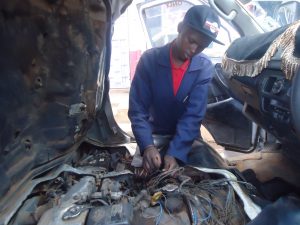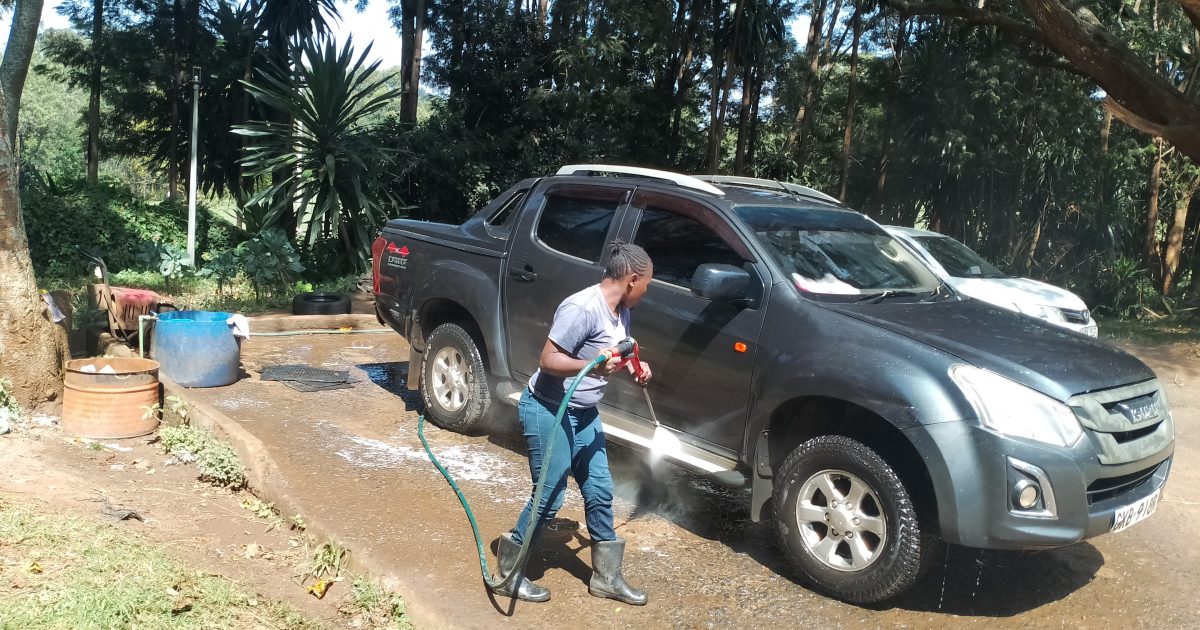The overall unemployment rate in Kenya stands at 12.7 percent according to recent statistics by the Federation of Kenya Employers (FKE).
It is also estimated that over 1 million young people enter the labour market annually devoid of any skills after having either dropped out of school or completed school and not enrolled in any tertiary college.
This acute shortage of job opportunities for young people in Kenya has in the long run not only pushed hundreds of young people into self-employed ventures but also forced women to take roles which were hitherto viewed as exclusively reserved for men.
Lydia Muriithi falls into this category. Ms Muriithi resides in Giakanja but works in King’ong’o where she ekes a living as a cobbler.
Initially, she was working in the hospitality sector but had to quit her job to take care of her child.
“I left my previous job in order to cater for my child. The job I was doing was too demanding as we worked in shifts and I was mainly placed in night shifts. Leaving my child at a friend’s house or with relatives was also an embarrassment since I didn’t want him to be a bother,” explains Muriithi.
However, before trying her hand in self-employment, she first weighed the risks and the possible hits.
After evaluating all the available business opportunities, shoe repair finally emerged as presenting the least challenges. It also required less capital and less space from where to operate.
Today the cobbler, after having been in the occupation for close to eight years, singles out client satisfaction as the difference between staying in business and closing down.
But when she began, things were however a bit challenging. “A customer would walk into my establishment and from the facial expression, you’d see the surprise in their eyes seeing that the cobbler was actually a lady. Some would even ask me where the cobbler is,” she says.
Over the years she has been in this business, she says she has seen dozens of clients who come and commend her for work well done. Some were persons she had never ever dreamt of meeting in her lifetime.
And it is through such clients that she has managed to keep her business growing by the day. And this is where her joy really lies.
“This makes me proud of my job and that is why I keep coming to my workshop. The satisfaction of my customers brings me joy and that is why I love my job,” she says.
On average, she mends a minimum of 20 pairs of shoes daily which enables her to feed and take care of her three children.
She appeals to the youth not to be selective when it comes to job hunting for jobs but to go for what would give returns at the end of the day.
She noted that many young people lived in poverty even when they could venture into ready opportunities that could earn them money.
“I wish to urge the youth to try and venture into all kinds of jobs. It goes a long way once you have mastered the ropes of the job. And for ladies who wish to venture into male dominated occupations, let them know this will demand courage and resilience. The good news is that those who dare to scale such heights end up being successful,” added Ms Muriithi.
We also met Margaret Gitonga at her workplace, swabbing a car she had just finished washing. She works at a carwash located within the Central Region Commissioners office headquarters.
The complex also hosts the bulk of both the County and national government offices.
Coincidentally, just like Ms. Muriithi, Margaret also began working at the carwash in 2017.
On a normal working day, she can wash an average of 20 cars and she receives 40 percent commission of the proceeds from her employer.
“Washing a car depends on the preference of the owner. For a general body wash, we charge Sh200 for saloon cars, Sh600 for canter trucks and Sh1000 for large trucks. We also wash the inner parts of the vehicle including the engine which is charged at Sh200 also,” she says.
But working at a carwash as a woman comes with its own fair share of challenges because the field is again dominated by men.
“Occasionally, when first time customers bring their vehicles, they often doubt my ability to do a perfect job including whether their cars will not be damaged. Others tend to stand by and watch as I work. Notwithstanding such challenges, over the seven years I have been in the industry, I have learnt how to handle all my customers,” Gitonga adds.
Ms Gitonga wants the youth to take any available opportunity that can earn them a livelihood and not to look down upon menial jobs as they could be the difference between poverty and a source of livelihood.
“If I were selective while I was looking for employment, I wouldn’t be working here. ‘Kazi ni kazi, muhimu ni mapato’. (Any type of work is worth the take as long as there is pay),” she concludes.
When we met Sarah Wanjiku at her garage located near the Batian hotel, she was in her customary blue working overalls, black sports’ shoes and a black cap ready to undertake her routine duties.
The 20-year-old girl was born in Nyeri in a family of five children. She later attended Temple Road primary school before joining Riamukurwe Secondary school where completed her studies in 2019.
Wanjiku however says it was during her childhood days when she developed a liking to the automotive industry, a passion which was to shape her career path in life.

“Immediately after I had completed my high school studies in 2019, I embarked on training as a mechanic specializing in electrical wiring. It has however taken me two years to gain the required skills,” narrates Wanjiku.
Unlike other women who were often shy to take such odd jobs due to societal prejudice, Wanjiku says she was lucky since her family has always stood by her side urging her to follow her heart.
And among those who have cheered her most is her mother. “I no longer depend on my family since I started this job. I have also been able to rent my own house and cater for my personal needs. Above all, I am happy since most of the customers appreciate my work despite the fact that I am a woman,” she added.
She narrates that the major challenge one faced in the occupation was that in the process of repairing a customer’s vehicle, one may damage it by mistake.
“Despite being an expert in this career, we still find ourselves making some mistakes. That’s why it’s critical to keep on learning and unlearning for you to keep improving,” she adds.
Martin Ngari, who is Wanjiku’s coworker, describes her as a hardworking lady who at times worked better than some of the male colleagues.
He heaps praises on her for her professionalism and high sense of discipline at work, adding that in this career, one needs to be confident.
“She is committed to her work and has so far yielded good results. I never get complaints from customers and whenever I am not around, she handles everything well. Everyone can do this job irrespective of gender,” says Simon Ndung’u her boss
Wanjiku encourages the youths especially the young ladies to venture into the same field or any other that has been traditionally been male dominated.
She is one person who believes in herself and is always prepared for what may come her way.
By Samuel Maina and George Gerish





